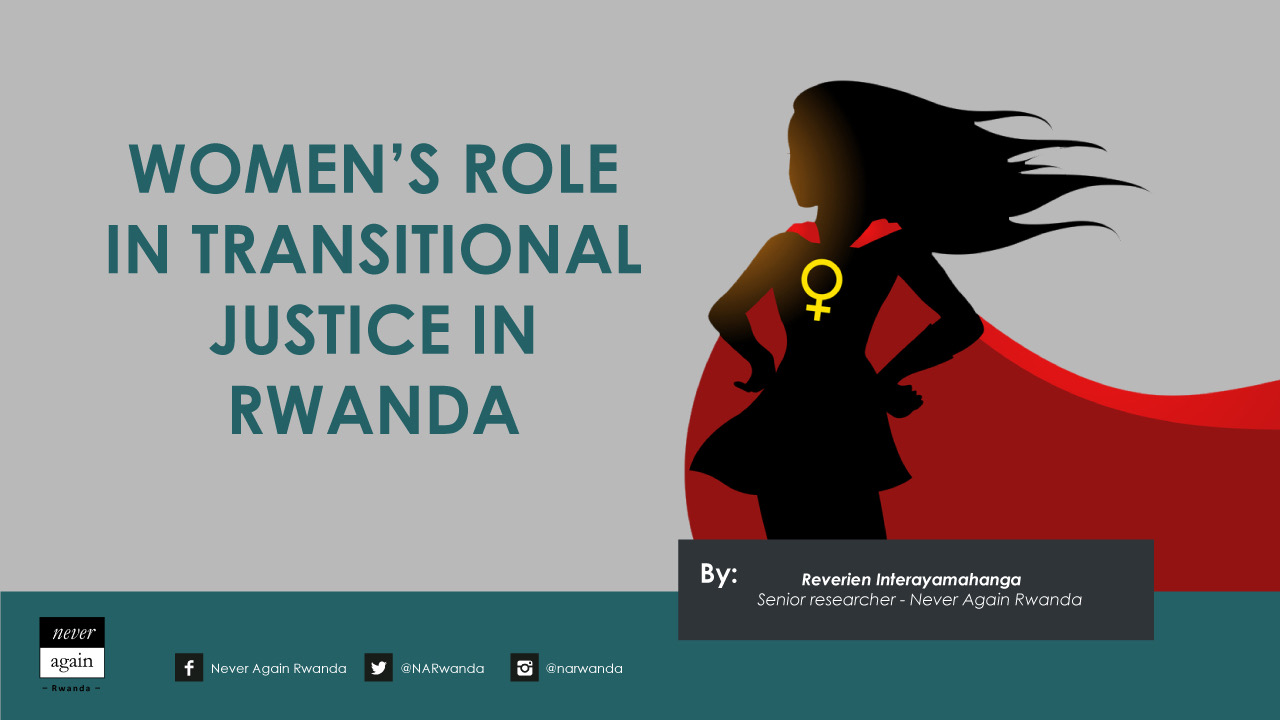Background
Over the past two decades, the nexus between gender and transitional justice has increasingly gained the attention of peacebuilding scholars and practitioners. Although men are more actively involved in violent conflicts and human rights violations, the extant literature shows that women and girls are more affected than men and boys. Despite this situation, women and their specific gender needs have been overlooked in many transitional justice processes.
In Rwanda, the history of cyclical violence that culminated into the 1994 genocide against the Tutsi deeply affected women and girls. Besides the vile genocidal rape and related sexual violence against Tutsi women and girls, other women were widowed while still others – mainly Hutu saw their husbands detained or imprisoned over actual or alleged crimes of genocide and crimes against humanity. Paradoxically, some women also joined some of their husbands, brothers, or neighbors to exterminate Tutsi and instigate rape of Tutsi women.
Considering women’s plight in this context, one would expect women to play an active role in post-genocide reconstruction and in the transitional justice process. To date, there is plenty of academic literature about women in post-genocide Rwanda. Most of it focuses on women mainly as victims, but also as perpetrators. However, there is not much work that documented women’s role in transitional justice. This article seeks to briefly review the little extant literature to discuss the women’s role in Gacaca jurisdictions in post-genocide Rwanda.
Gacaca tribunals are a revived traditional justice system, which served as a homegrown solution to tackle the very challenging bone of contention resulting from the 1994 Genocide against the Tutsi. Rwandans eventually chose this traditional system after noticing that the then classic judicial system had fallen apart, and was therefore unable to try over 120,000 detained suspects. It was established that such a high toll of suspects would have taken ordinary courts over a hundred years to try. Similarly, between 250,000 and 350,000 girls and women mostly Tutsi – were raped. Officially, Gacaca kicked off in 2001 and closed on 18 June 2012 after judging over a million suspects.
Unlike in many countries such as South Africa and Uganda where women’s role was not considered across transitional justice processes, Rwanda made a significant difference in this regard. Women’s role is explored at two levels: women as individuals and women’s organizations.
Women as voters, judges, and witnesses
Individual women played a vital role in the Gacaca process as voters, as inyangamugayo (judges), and as witnesses. In the first capacity, women participated massively in the elections of Inyangamugayo that took place from 4th to 7th October 2001.
In the second category, women contested those elections and won an important proportion of positions (of judges). As of 2005, 34% of Gacaca judges were women 5 As time went by, the proportion of women judges in Gacaca courts turned up to 37% by their closure in 2013.
It is also worth highlighting that female judges took this opportunity to “encourage women to report GBV, which is frequently not reported because of the stigma associated with being a victim.”
As witnesses, female survivors of the Genocide Against the Tutsi were at the forefront of Gacaca court trials. Some had been victims of genocidal rape and other sexual torture. They testified against the genocide suspects, both “big” and “small fish”. In a similar vein, in certain cases, some women survivors, like their male counterparts, testified for suspects who were unfairly charged. Interestingly, in some cases, the wives of perpetrators also testified before Gacaca courts, either in favor or against their husbands who were then genocide suspects.
Women’s organizations: Awareness raising, women’s mobilization and advocacy
Since the inception of the Gacaca process, women’s organizations have played an instrumental role in ensuring that women’s participation is not only real and active but also that gender issues are considered in the court’s agenda. In this regard, these organizations conducted substantive work in raising women’s awareness and mobilizing them to participate in Gacaca processes. These are organizations mainly grouped in Profemmes Twese Hamwe, an umbrella of Rwandan women’s organizations. Women (ordinary women, women’s organizations, and women leaders including women parliamentarians) were involved in the making of the law governing Gacaca courts. In a similar vein, they actively participated in mobilizing other women to not only support these courts but also to play the role of either judges or witnesses.
Regarding gender justice, women’s organizations in collaboration with genocide survivors’ organizations successfully advocated for the consideration of rape as a genocidal crime. “At the beginning of the Gacaca trials, rape was placed as the fourth least serious [offense]. Pro-femmes/Twese Hamwe, in collaboration with other women’s organizations and genocide survivors’ organizations, advocated successfully for this crime to be considered as a crime of genocide and crime against humanity, resulting in it being placed in category 1.”
Therefore, women have not merely been victims and perpetrators of violence and the genocide in Rwanda. They also played a vital role in the transitional justice process after the genocide. Women took advantage of an already conducive political environment to advocate for and materialize their participation in that process. This is strong evidence that women’s right to participate and own post-conflict reconstruction and transitional justice can be a reality. It just takes political will and tangible commitments.
Reverien Interayamahanga
Senior researcher – Never Again Rwanda


